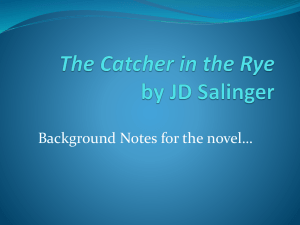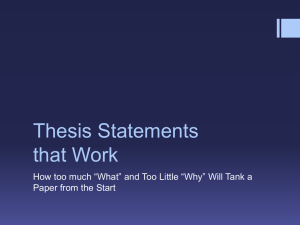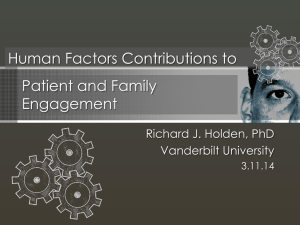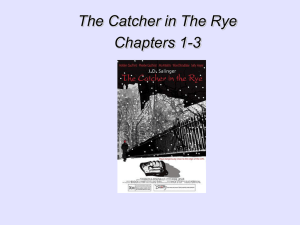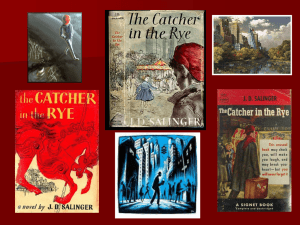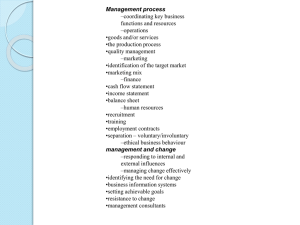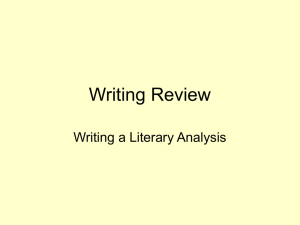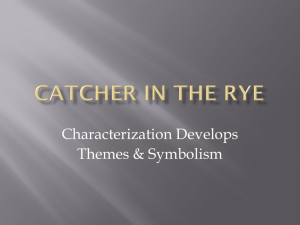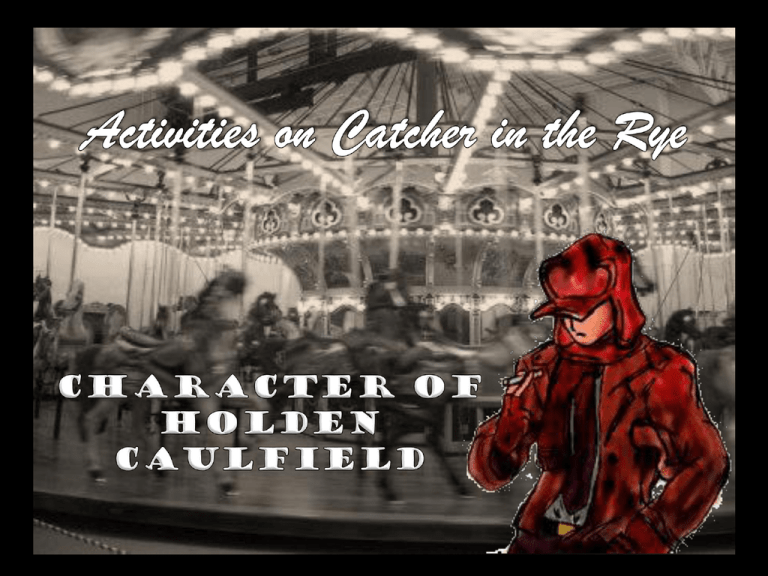
Characterisation: behaviour, attitudes and opinions?
•
•
•
•
Holden Caulfield, a 16 year old teenage boy is described as being skinny for his age, with grey
hairs on one side of his head.
Throughout the book, Holden expresses his various attitudes and values on a number of
things like personal characteristics or judgemental opinions from a solitary and defensive
perspective. These impressions define Holden as a character and give us an indirect
commentary to other characters.
When Holden observes his surrounding commenting critically on people and society in
general, it becomes obvious that Holden often contradicts his thoughts and opinions. Holden
often filters his speech in order to please those around him, yet he thinks the complete
opposite in his head e.g. when Holden is talking to Ernest’s mother on the train and lying
about how he is one of the most “popular boys in school”, while in reality he believes he is
doubtless “the biggest bastard”.
In particular he repeatedly explains how much he hates “phonies” such as his brother D.B.
who sold out to Hollywood, D.B.s ex-girlfriend and even Stradlater, a shallow and “secret
slob”. In saying this however, Holden is often recognised as a phony himself such as when he
gives himself the identity of Rudolf Shmidt on the train or when he refuses sexual
opportunities despite always thinking, questioning and desiring sex e.g. lying to Sunny the
prostitute about having a “clavichord injury” to avoid having sex. He also contradicts himself
by having a strong desire for innocence and an immature mind, yet undertakes adult
activities e.g. drinking & smoking.
•
•
Through his personal insecurities and rough past (such
Allie’s death, flunking a number of schools and losing
valued relationships) Holden explores self
hatred/disappointment and in turn presents a phony
persona to hide his flaws. He even admits that he probably
“wouldn’t sock a guy in the face” because he is a coward
and fears confrontation. This phony exterior contrasts
against many of his attitudes, especially how he “hates
phonies”, because he is one himself.
Holden’s 16 year old hormones also explain his curiosity
and immature behaviour. He uses slang language and
vulgar words such as “crumby”, “lousy”, “sunuvabitch” and
“bastard”, as has been kicked out of Pencey Prep for failure
to apply himself in class, emphasizing his teenage
carelessness and unmotivated attitude. His spontaneous
behaviour, unrealistic approach to life and naiveté also
highlight his childishness e.g. when he asks Sally to run
away into the woods with him and escape society.
•
•
As an unexperienced and developing teenage boy, he is often exploring the concept of sex,
constantly asking his peers personal questions and becoming aroused. Despite this, however,
Holden has a mature approach to his moral values and believes that sex should be a mutual
act of love rather than a casual act of pleasure. Alternatively, his blatant and rude remarks,
are very immature e.g. when he asks Luce about his sex life- “do you like that? Her being
Chinese?” showing his lack of manners and inability to want to be or act like an adult. He is
also curious about other insignificant aspects of life such at the ducks at Central Park and the
idea of “the catcher in the rye”, and constantly rambles on about irrelevant details e.g. “being
yellow”.
Because of Holden’s troubled past and insecurities, He loathes the idea of adulthood,
growing up, responsibility and reality, because he himself wants to escape into an effortless
world of purity and happiness, to leave behind self hatred and revulsion for his life. This is
again supported by Holden’s solitary journeys and experiences where his reserved yet
socially sophisticated character hides his very defensive and subverted inner thoughts and
personality. His red hunting hat is also a significant motif used as a defence mechanism
against the world and represents Holden shying away from the pain of reality and as a source
of protection and comfort.
•
•
For this reason, Holden wants to be “the
catcher in the rye” saving children from the
darkness of reality e.g. when he lies to
Earnest’s mother to prevent upsetting her, and
how he wishes he had saved Allie. He tries to
remain a child in order to avoid reality, hence
his reason for hating adulthood. He does not
get along with adults because they are too
serious and depressing and tell Holden to grow
up. Holden would rather ignore facing reality
and dislikes their lectures that make him feel
ashamed of himself.
Holden is clearly alienated from the world,
evident by his solo journeys and desperation
for companionship. This, as well as bad
memories & experiences lead Holden down a
dark path of depression and negativity e.g. the
death of Allie, the suicide of a Pencey student,
the writing “Fuck You” written on walls, and
flunking out of school. His depression and
alienation results in his constant judgment of
those around him and his desperation for
company e.g. when he asks the ‘sore’ taxi
driver to accompany him for drinks, even
though he was rude and didn’t like him very
much. He also procrastinates and
contemplates calling Phoebe, Jane or his
parents, to inform them about leaving Pencey
or in spite of his loneliness.
•
•
Holden Caulfield can also be considered a hypochondriac where he exaggerates his
experiences or emotions e.g. when he’s walking in the street and thinks he will most
probably get cancer and die. His extreme paranoia, and homophobia, also leads him to
believe Mr. Antollini is a pervert after waking up to him stroking his forehead in the dark. His
paranoia and outlook of adults in such a way, may have also been derived from his previous
experiences in the past e.g. “that stuff‘s happened to me about twenty times since I was a
kid” implying that Holden may have had a history of sexual harassment. His negative focus on
Jane Gallagher’s “booze hound” father also suggests Holden’s disrespect and suspicion of
such people. Holden trivialises these insignificant circumstances but also casually brushes off
large and significant events at ease in a way that supports the idea of refusing to accept
reality, take responsibility or deal with his past. An example of this would be Allies death,
where Holden casually states his brother’s death yet later mentions that he feels partly
responsible or guilty for the tragic event.
These factors of his past and present emotions that are hidden by self hatred for his phony
exterior hide his insecurities and develop Holden’s judgmental opinions, perfectionist ways
and spontaneous actions. Through his inner thoughts and exterior behaviour he explores
morality and discovers his desire to save others from the troubled life he lives by being “the
catcher in the rye”.
What influences him as a person?
•
•
•
•
•
The character Holden is created by many people and events in his life just like a house is built
with bricks. He is made to feel completely powerless of what happens around and towards
him, thinking he has no point in this life. He has witness and suffered two major trauma’s in
his life, the first being the death of his brother Allie whom he now regrets not spending
enough time with and admirers dearly, another is the suicide of one of his school mates.
These have both affected him and made him to the boy he is today.
His little sister Phoebe is the sweet world of innocence which Holden craves, because that’s
where him and Allie where together, happily. Phoebe influences Holden attitude towards
leaving home, being reluctant to change and growing up to maturity.
Holden describes all his siblings Allie, Phoebe and D.B to be highly intelligent and all
overachievers in their own individual ways. He is self-conscious and very insecure due to
comparing himself to his siblings and his parent’s disappointment each time he fails a school
(failed four).
Happy Childhood memories such as frequent trips to the museum with his primary school
influences him to want a non-changing world where ‘nothing ever moves’ he believes life is
easier and a lot simpler that way.
Allie is a major part of Holden’s life even though his dead, his reaction on the night of Allie’s
death (breaking all the garage windows and physically damaging himself) shows his grief and
irritation. He still keeps Allie’s baseball mitt with him when he goes away to boarding school
to keep him close and wishes he would have spend more time with him. Grief is a large part
of Holden’s character and is the starting area where he goes down the road of mental illness.
Relationships: parents, adults and women
•
•
•
Holden Caulfield is a judgemental and naive teenage boy, caught up with his
feelings of depression and his hormones.
Holden’s alienation from the world, suggests his reluctance to create close
relationships with the people around him. His inability to face up to reality and
accept change emphasises how he distances himself from his parents, adults and
women, who are symbols of maturity and the coming of age.
Holden tries to avoid growing up, and longs for the innocence of his childhood. He
constantly focuses on the negative aspects of adulthood, and dislikes how they
only speak about depressing topics such as sex, jobs or money. This is why Holden
has such a close relationship with children, especially his younger sister Phoebe.
He gains comfort and reassurance when he interacts with Phoebe and enjoys
talking to her about insignificant childish matters. He opens up in a way in which
his constricted personality would never allow for others, revealing his true colours.
He admires how children are so naive and innocent, therefore wanting to be “the
catcher in the rye”, saving children from danger and the troubles he himself has/is
experiencing as he faces the reality of growing up. He even admits to not liking
adults much, and reinforces this when he watches Phoebe sleep, stating that kids
“look alright” when they sleep whereas adults “look lousy”.
•
•
•
•
Overall Holden is quite polite and sophisticated towards the elderly and adults to please and
impress them; however his inner thoughts reveal how he truly feels. When in company of an
adult, such as Mr Spencer, Mr Antollini and his parents, we see how Holden feels pressured
to face reality, causing him to become depressed or ashamed of himself. When Mr Spencer
lectures Holden about flunking four of his subjects we see how uninterested and frustrated
he becomes, “beginning to sort of hate him” and how “didn’t like him saying that...it was very
depressing”. Holden’s irritation represents his reluctance to face the consequences of
flunking & leaving Pency Prep. This is also evident when Mr Antollini tells Holden he is in for a
“terrible fall” and he becomes increasingly uncomfortable and tired, and loses concentration.
Holden’s feeling towards his parents becomes extremely obvious as the book progresses.
Despite thinking that “they’re nice and all” he also thinks they are “touchy as hell” revealing
why Holden fails to tell them that he was kicked out of Pencey. He is ashamed of his lack of
application at school and is afraid to tell his parents because he predicts their reaction will
make him depressed and angry. He avoids his parents and never seeks their advice or
company, instead resorting to adults such as Mr. Antollini.
Holden’s uncomfortable experiences and paranoia also adds to Holden’s dislike for adults. For
example Holden feels uncomfortable, betrayed and victimised when he wakes to find Mr.
Antollini stroking his forehead in the dark. He also disrespects Jane Gallagher’s “Booze
hound” stepfather. These examples put a negative emphasis on adult behaviour, and put
Holden in an awkward position on top of his depression.
Holden also has awkward relationships with women. He contradicts himself when he is
constantly thinking about, questioning and desiring sex, yet always passes the opportunity to
do so. When hiring a prostitute, Sunny, we see how uncomfortable Holden feels leading him
to lie about his “clavichord” injury where he was unable to participate in sexual activity. He is
extremely nervous and doesn’t like the idea of sex without intimacy or passion. This is also
evident when Holden becomes defensive of Jane Gallagher after Stradlater takes her on a
date. Holden loathes the idea of Stradlater, a shallow jock, taking advantage of his innocent
childhood friend.
•
•
In a way, we see how Holden feels as if losing his virginity is like losing his youth and
innocence, a transition into adulthood where his childhood is left behind.
Holden’s experiences with Sally Hayes also show his lack of skill and immaturity. Despite
‘making out’ with her in the back seat of a taxi and proposing they elope into the woods, we
see Holden’s inability to commit to her mentally, and how he insults her thoughtlessly, calling
her a “royal pain in the ass”. His rather rude behaviour and rollercoaster relationship with
Sally, also highlights how Holden distances himself from people, especially those who
threaten to steal his (or the girls) youth & innocence.
Holden’s attitudes towards
school:
•
Holden's attitude toward school, in his own experience, is that of detest and
hatred. In the book, he attends Pency Prep, an expensive all-boys boarding school,
but it is evident that he has attended several similar schools before hand and had
either flunked out or quit. As for the students, he believes all they are all
"phoney". He says that "The more expensive a school is, the more crooks it has in
it" (chapter 22), which shows his dislike for the students and his lack of
appreciation for his socioeconomic background, which is wealthy and upper-class.
Holden alienates himself from the other students, as they don't get on and he
shows no emotional connection towards anyone except Phoebe, his deceased
brother Allie and the student that killed himself at school. His roommate,
Stradlater, is what we would classify as a "jock". Holden says he doesn't like him, as
he is a phoney and a womanizer, which Holden detests. But Holden is two-faced,
and not upfront about his feelings to people, which in turn makes himself a
"phoney". His hate for other people is perhaps just him projecting his self-hatred
onto everyone else.
At the end of the book, he claims he is starting at a new school in September, as
for whether or not he will try harder and not flunk out is up to the reader.
How does Holden Caulfield deal with
Change?
•
•
•
Holden Caulfield has trouble dealing with change, he is afraid of
change as the change he has previously experienced has always
been traumatic for him. Holden’s past experiences of change still
haunt him, his experience with the death of his brother caused
him to encounter a break down which resulted in the breaking of
Holden’s hand “My hand still hurts me once in a while” shows
that Holden has not, and cannot forget or get over the past
change that haunts him. Holden’s constantly associates change
with pain, hence his intense fear.
Holden can no longer view change as good and so his way of
dealing with it has evolved to simple avoidance “Certain things
should stay the way they are”. Holden Avoid change by never
allowing himself to succumb to the draw of his future, as he is
about to change something of himself, he avoids via a sudden
change of topic “Don’t you feel like...”
Holden Caulfield will not admit to himself that he has a problem
with change, Holden will always come up with an excuse, simply
to ‘prove’ to himself that he had no fear “sexy was about the last
thing I was feeling” Holden just couldn’t admit to himself that
what he was truly feeling was a fear, he instead kept telling
himself he was just depressed.


